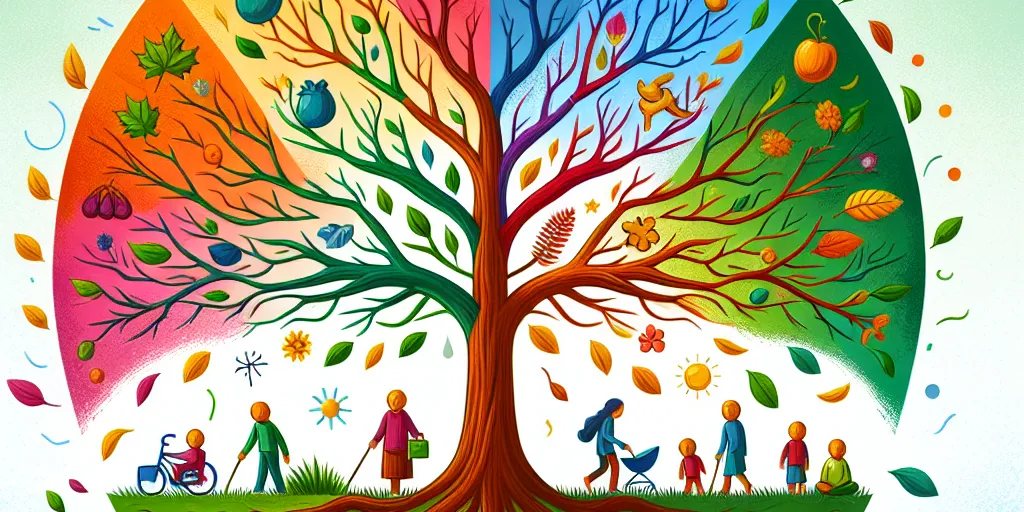· Sophia Thompson · personal growth · 10 min read
Unlocking Potential: Self-Improvement Strategies for Success
The Pathway to Your Best Self

Embarking on a journey towards self-improvement involves more than just the desire to improve; it’s about strategically aligning actions to our most ambitious goals. This post delves into the core self-improvement strategies for success, offering a blueprint to not only chase but catch our dreams. From understanding the power of mindset to mastering the art of productivity, each strategy serves as a cornerstone in the foundation of a more fulfilled self. Whether you’re looking to bolster your confidence, sharpen your focus, or simply find more joy in the daily grind, these strategies offer a path forward.
Dive into the essence of the following sections to embark on your journey towards personal transformation:
- Crafting a Growth Mindset
- Setting and Achieving Goals
- Mastering Productivity Techniques
- The Power of Habit Formation
- Cultivating Emotional Intelligence
- Embracing Lifelong Learning
Crafting a Growth Mindset
A growth mindset, coined by psychologist Carol Dweck, is the belief that one’s abilities and intelligence can be developed through dedication and hard work. This concept is a fundamental building block for those seeking self-improvement and ultimately, success. Unlike a fixed mindset, which treats intelligence and talent as static traits, a growth mindset thrives on challenge and sees failure not as evidence of unintelligence but as a heartening springboard for growth and for stretching our existing abilities.
At the heart of crafting a growth mindset is the understanding that effort plays a crucial role in our success. It’s about learning to appreciate the process of getting better at something and valuing what we can learn from the challenges we face. Embracing this mindset means giving ourselves the permission to be imperfect, to face difficulties head-on, and to use them as opportunities to develop.
To cultivate a growth mindset, start by recognizing and challenging any underlying beliefs that support a fixed mindset. This might include paying attention to your self-talk and consciously shifting from a fixed to a growth-oriented dialogue. For instance, instead of telling yourself, “I’m just not good at this,” try, “What am I missing? How can I learn this?” Acknowledging that struggle and effort are part of the learning process can transform the way you approach challenges.
Embracing failure as a learning tool rather than a setback is another key component. When we allow ourselves to fail and learn from those failures, we not only improve but also build resilience. This resilience propels us forward, ensuring that we’re continuously evolving and moving closer to our goals.
Setting and Achieving Goals
 Setting and achieving goals is pivotal to any self-improvement strategy. It’s about creating a vision for your future and then mapping out the steps to turn that vision into reality. Goals give us direction, motivate us, and serve as benchmarks for measuring our progress.
Setting and achieving goals is pivotal to any self-improvement strategy. It’s about creating a vision for your future and then mapping out the steps to turn that vision into reality. Goals give us direction, motivate us, and serve as benchmarks for measuring our progress.
To set effective goals, it’s crucial to make them SMART: Specific, Measurable, Achievable, Relevant, and Time-bound. This framework not only makes it easier to identify what you truly want to achieve but also provides clarity and focus.
- Specific: Clearly define what you want to accomplish.
- Measurable: Determine how you will measure progress and success.
- Achievable: Make sure it’s something within your reach.
- Relevant: Your goal should align with your values and long-term objectives.
- Time-bound: Set a realistic deadline for completion.
The future belongs to those who believe in the beauty of their dreams.
--- Eleanor Roosevelt
This quote by Eleanor Roosevelt reminds us of the importance of believing in the possibility of achieving our goals, no matter how distant they may seem. To turn these dreams into reality, breaking down your larger goals into smaller, manageable tasks is essential. This approach not only makes the goal seem more achievable but also provides regular opportunities for celebration as you complete each step, thus maintaining motivation.
Regularly reviewing and adjusting your goals is also crucial. Life throws curveballs, and flexibility allows us to stay on track even when our circumstances change. Constant reflection ensures that our goals remain aligned with our evolving aspirations and capabilities, making the path to success a dynamic and responsive journey.
Remember, the journey toward any goal is seldom linear. Embrace each setback as a learning opportunity and every achievement as a stepping stone towards your next challenge.
Mastering Productivity Techniques
In the pursuit of self-improvement, mastering productivity techniques is essential. It’s not just about doing more things in less time but doing the right things effectively. Productivity techniques empower us to prioritize, focus, and achieve our goals with less stress and more efficiency.
One popular method is the Pomodoro Technique, which involves working for 25 minutes followed by a 5-minute break. This method encourages short bursts of focus and helps prevent burnout. Another effective strategy is time blocking, where you allocate specific blocks of time for different tasks or activities throughout the day, ensuring that you dedicate focused time to each of your priorities.
Concentrate all your thoughts upon the work in hand. The sun’s rays do not burn until brought to a focus.
--- Alexander Graham Bell
This quote by Alexander Graham Bell highlights the importance of focus in productivity. It’s not enough to be busy; the question is, what are we busy about? Creating a daily to-do list and setting clear, achievable goals for each day can help bring our efforts into focus and ensure that we’re making progress on the things that truly matter.
Additionally, harnessing the power of technology can greatly enhance productivity. Apps for task management, note-taking, and time tracking can be invaluable tools in organizing our work and optimizing our work processes.
However, it’s important to remember that at the heart of productivity is the discipline to commit to the techniques that work best for you. Experiment with different strategies, find what fits your style and needs, and then stick with it. Consistency and adaptation are key in the journey towards mastering productivity techniques.
The Power of Habit Formation
 The power of habit formation lies in its ability to transform our lives in seemingly small but profound ways. Habits shape our existence, from the moment we wake up to the time we go to bed. They constitute our daily routines, influence our decisions, and ultimately, determine our success and happiness.
The power of habit formation lies in its ability to transform our lives in seemingly small but profound ways. Habits shape our existence, from the moment we wake up to the time we go to bed. They constitute our daily routines, influence our decisions, and ultimately, determine our success and happiness.
Understanding the mechanism behind habit formation can be a game-changer. Every habit follows a simple loop: cue, routine, reward. Identifying and manipulating these components can help us replace bad habits with good ones, fostering change that aligns with our self-improvement goals.
A personal anecdote comes to mind when I think about the power of habit formation. A few years ago, I noticed my mornings were chaotic, leaving me feeling unproductive and frazzled for the rest of the day. I decided to instill a morning routine that began with making my bed, followed by a short meditation. Initially, it was a struggle. However, the cue (waking up) followed by the routine (making the bed and meditating) and the reward (a sense of accomplishment and peace) gradually became second nature. This simple change not only improved my mornings but also had a ripple effect on my productivity and mindset throughout the day.
Incorporating keystone habits, such as regular exercise or daily reading, can have similarly transformative effects. These habits create positive feedback loops that spill over into other areas of our lives, fostering widespread improvement.
To harness the power of habit formation, start small. Focus on one habit at a time, keep the cue and reward consistent, and be patient with yourself. Change might not happen overnight, but with persistence, the compound effect of good habits will lead to significant self-improvement.
💡 Limiting beliefs are like imaginary handcuffs—unrealistic thoughts that hold us back. The fun twist? Once recognized, they lose their power. Imagine breaking free from the shackles of self-doubt! Acknowledging and challenging limiting beliefs is the first step to a liberating dance towards personal growth and success.
Cultivating Emotional Intelligence
Cultivating Emotional Intelligence (EQ) is as crucial for success as intellectual ability. EQ involves understanding, using, and managing our emotions in positive ways to relieve stress, communicate effectively, empathize with others, overcome challenges, and defuse conflict. It impacts many different aspects of our daily life, including our relationships, career, and overall well-being.
A high EQ allows us to be aware of our emotions and the emotions of others, to discern between different feelings correctly, to label them appropriately, and to use this emotional information to guide our thinking and behavior. It empowers us to take control of our emotional responses to situations and to navigate social complexities with more awareness and less reactivity.
I recall a time when I struggled with a co-worker. Initially, our interactions were marked by frustration and misunderstanding. When I decided to work on my emotional intelligence, specifically on empathy and effective communication, I noticed a significant change. By actively listening and striving to understand my co-worker’s perspective, we found common ground and improved our working relationship. This personal experience underscored how EQ can transform interpersonal dynamics and lead to more supportive and collaborative environments.
To cultivate your emotional intelligence, practice self-awareness by regularly checking in with your emotions, ask for feedback from others to gain a better understanding of your emotional expression, and practice empathy by putting yourself in others’ shoes. Remember, like any skill, EQ can be strengthened over time through intentionality and practice, resulting in profound improvements in how we navigate our world.
Embracing Lifelong Learning
In a world that’s constantly changing, embracing lifelong learning is not just a technique for self-improvement; it’s an essential strategy for staying relevant and fulfilled throughout life. Lifelong learning involves continually acquiring new knowledge and skills, not just for professional development but for personal enrichment as well.
The benefits of lifelong learning are manifold:
- Encourages curiosity and open-mindedness.
- Enhances employability and adaptability in a rapidly changing job market.
- Improves self-esteem and morale by conquering new challenges.
- Fosters a sense of achievement and personal satisfaction.
One of my most significant shifts towards lifelong learning came when I decided to learn a new language after many years out of school. The process was challenging but incredibly rewarding. This endeavor not only opened up new cultural vistas for me but also improved my cognitive skills. It was a clear reminder that we’re never too old or too settled in our ways to learn something new.
To integrate lifelong learning into your life, consider the following strategies:
- Set clear, achievable learning goals.
- Use online platforms and local classes to explore topics of interest.
- Join a community or group focused on learning or a specific area of interest.
- Teach others what you learn to reinforce your understanding.
By viewing life as an endless opportunity to grow, we not only enrich our personal and professional lives but also contribute to a more informed, empathetic, and adaptable society. Embrace the journey of lifelong learning and watch as your world expands in the most wonderful ways.
Remember, the journey of self-improvement is an ongoing process. It requires patience, perseverance, and a pinch of bravery to step out of your comfort zone. Keep these strategies in mind as guideposts along your path. Let each step you take be deliberate and full of purpose, leading you to the success and fulfillment you seek. Here’s to your journey towards a better, more improved you!




